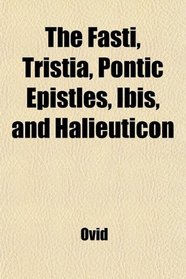Search -
The Fasti, Tristia, Pontic Epistles, Ibis, and Halieuticon
The Fasti Tristia Pontic Epistles Ibis and Halieuticon
Author:
Purchase of this book includes free trial access to www.million-books.com where you can read more than a million books for free. This is an OCR edition with typos. Excerpt from book: ' Lupercai,' or what reason marks the day with a similar name. The Vestal Ilia'5 had given birth to her heavenly progeny, while her uncle held the sovereign sway... more »
Author:
Purchase of this book includes free trial access to www.million-books.com where you can read more than a million books for free. This is an OCR edition with typos. Excerpt from book: ' Lupercai,' or what reason marks the day with a similar name. The Vestal Ilia'5 had given birth to her heavenly progeny, while her uncle held the sovereign sway... more »
ISBN-13: 9781458875716
ISBN-10: 1458875717
Publication Date: 8/2/2009
Pages: 80
Rating: ?
ISBN-10: 1458875717
Publication Date: 8/2/2009
Pages: 80
Rating: ?
0 stars, based on 0 rating




